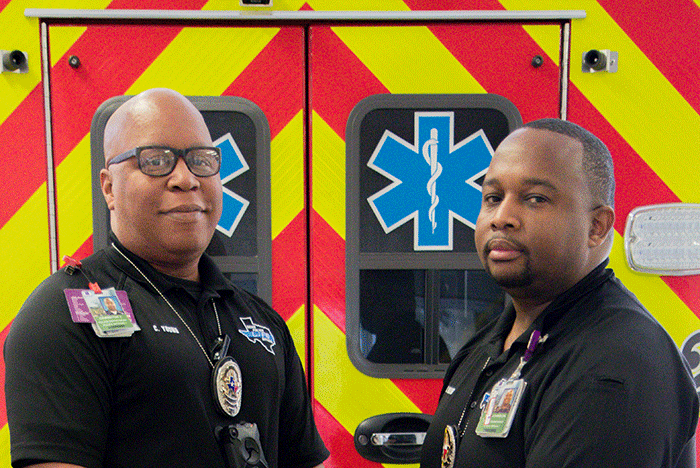Hospitals use relationship-based approach to calm patients

Parkland LIFE officers Cranston Young (left) and Roy Johnson are members of a special mental health peace officers team of the Dallas County Hospital District Police Department.
Image courtesy of parkland health & hospital system
The story of a man named Walker Hughes, 33, went viral in February after his mother, Ellen Hughes, blogged about their recent visit to Loyola University Medical Center in Maywood, Ill.
Walker has autism, and although his parents describe him as gentle, he was suffering one night from a paradoxical reaction from a prescribed medication that caused him to react in violence. Walker’s parents got him to the hospital as soon as possible, but also feared what would happen if his behavior continued to escalate while dealing with the hospital’s public safety officers. Ellen was happy to observe the officers defuse the situation. At one point, Walker kept trying to hop off of the exam table, but instead of restraining him, something else happened. Every time Walker stood up, the officers cheered “Walker gets up!” To help him sit back down, they would cheer “Walker sits down!” and he did. “Walker scoots back.” “Walker lies down.” Each cheer was met with Walker’s willing participation.
This relationship-based approach to safety and security is a trend among hospitals as awareness continues to grow around caring for patients with mental health issues.
At Parkland Health & Hospital System in Dallas, various departments worked with the Dallas County Hospital District (DCHD) Police Department to create the LIFE team. LIFE stands for Law Enforcement Intervention for Environmental/Patient Safety. The health system says the team was created in May 2018 to address the increase in behavioral health patients seeking care in already crowded emergency rooms. The goal of the LIFE team is for officers to “use a proactive approach to calm patients before they become highly agitated or in some cases violent,” according to a Parkland spokesperson.
The officers’ primary role is to assist in behavioral health areas or where patients have been placed under a mental health evaluation within Parkland’s acute care hospital, but they are still available to respond to calls where patients or visitors are displaying disruptive behavior.
All LIFE officers are required to obtain three certifications: Crisis Intervention Team, Mental Health Peace Officer and Satori Alternatives to Managing Aggression. “The LIFE program is relationship-based. LIFE officers establish relationships with patients who are high risk using therapeutic communication, which reduces the potential for violence,” says Celeste Johnson, Parkland’s vice president of nursing for behavioral health. “The officers also provide ongoing support for staff who care for high-risk patients.”
Officer Roy Johnson describes his role in very simple terms. “We listen,” he says. The officers, however, aren’t just trained to listen, but to observe, engage and relate. Small cues can help break the ice and get a patient to lower their defenses. LIFE officers will observe the individual’s clothing and personal belongings and will break the ice by mentioning what they see. Someone wearing blue and silver may respond positively to “How about those Cowboys?” In some cases, the disruptive behavior can be reduced by listening to what the patient has to say.
In addition to formal training, DCHD Chief of Police Marlin Suell says the team has also developed more subtle ways to create a calming atmosphere. “We’ve even taken the additional step of taking LIFE officers out of the traditional police uniform [and into] khaki pants and black polo shirts. Even this subtle change has been beneficial to patients and staff.”
A Parkland spokesperson says the system has seen major benefits since creating the LIFE team, such as fewer patients who may have been exhibiting a mental illness being placed into the criminal justice system. The system has also seen its number of patients placed under emergency detention decreased, and many patients who have repeat visits have come to trust the officers, resulting in smoother visits.
The hospital staff also says they feel an enhanced sense of security knowing the LIFE team is around.




